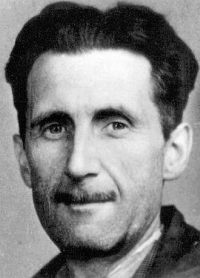The Lion and the Unicorn
Book Details
| Title: | The Lion and the Unicorn | ||||||||||
| Author: |
| ||||||||||
| Published: | 1941 | ||||||||||
| Publisher: | Richard Clay (The Chaucer Press) Ltd | ||||||||||
| Tags: | essay, socialism, English nationalism | ||||||||||
| Description: | An essay by George Orwell expressing his opinions on the situation in wartime Britain. The title alludes to the heraldic supporters appearing in the full royal coat of arms of the United Kingdom. The essay was first published on 19 February 1941 as the first volume of a series edited by T. R. Fyvel and Orwell, in the Searchlight Books published by Secker & Warburg.
It expressed his opinion that the outdated British class system was hampering the war effort, and that in order to defeat Nazi Germany, Britain needed a socialist revolution. Therefore, Orwell argued, being a socialist and being a patriot were no longer antithetical, but complementary. As a result, "The Lion and the Unicorn" became an emblem of the revolution which would create a new kind of socialism, a democratic "English Socialism" in contrast to the oppressing Soviet totalitarian communism—and also a new form of Britishness, a socialist one liberated from Empire and the decadent old ruling classes.-- Wikipedia. [Suggest a different description.] |
||||||||||
| Downloads: | 209 | ||||||||||
| Pages: | 47  |
Author Bio for Blair, Eric Arthur

Eric Arthur Blair (25 June 1903 – 21 January 1950), who used the pen name George Orwell, was an English novelist, essayist, journalist and critic. His work is marked by lucid prose, awareness of social injustice, opposition to totalitarianism, and outspoken support of democratic socialism.
Orwell wrote literary criticism, poetry, fiction, and polemical journalism. He is perhaps best known for his dystopian novel Nineteen Eighty-Four (1949) and the allegorical novella Animal Farm (1945). His non-fiction works, including The Road to Wigan Pier (1937), documenting his experience of working class life in the north of England, and Homage to Catalonia (1938), an account of his experiences in the Spanish Civil War, are widely acclaimed, as are his essays on politics, literature, language, and culture. In 2008, The Times ranked him second on a list of "The 50 greatest British writers since 1945".
Orwell's work continues to influence popular and political culture, and the term Orwellian—descriptive of totalitarian or authoritarian social practices—has entered the language together with many of his neologisms, including, but not limited to, cold war, Big Brother, Thought Police, Room 101, memory hole, doublethink, and thoughtcrime.--Wikipedia.
Available Formats
No book directory. Upload has not been completed.This book is in the public domain in Canada, and is made available to you DRM-free. You may do whatever you like with this book, but mostly we hope you will read it.
Here at FadedPage and our companion site Distributed Proofreaders Canada, we pride ourselves on producing the best ebooks you can find. Please tell us about any errors you have found in this book, or in the information on this page about this book.